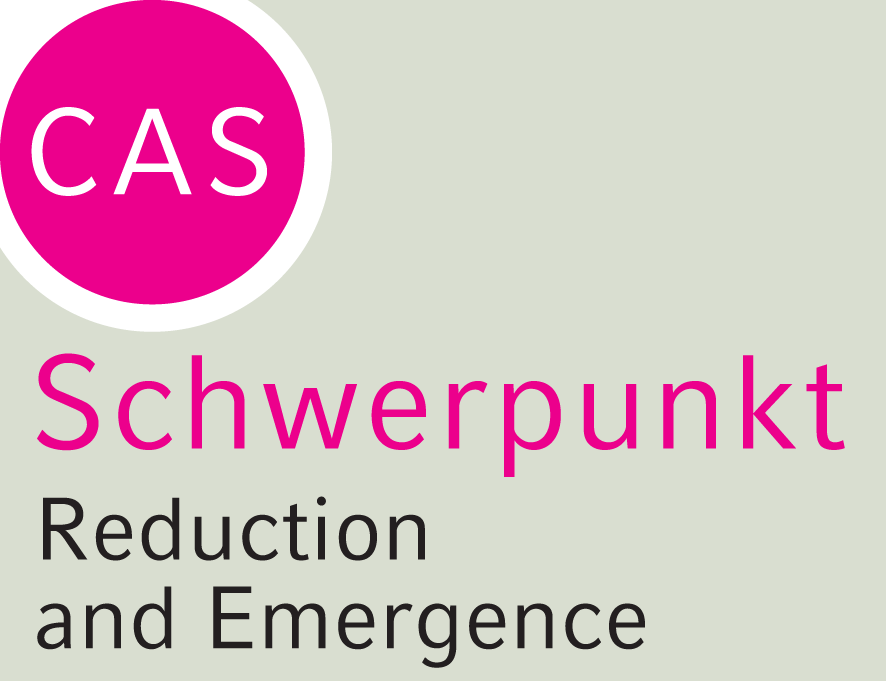Reduction and Emergence in the Sciences (14-16 November, 2013)
 Idea and Motivation
Idea and Motivation
 Reduction and emergence play a central role in the relations of scientific theories and disciplines. For instance, a reducible theory is in some sense replaceable but also supported by its reducing theory. In contrast, a theory that describes emergent phenomena arguably stands alone in both respects. Unfortunately, the discussion about reduction and emergence suffers from two uncertainties at once. On the one hand the concepts of reduction and especially emergence are not precisely defined, on the other hand there are few if any uncontentious cases of reduction or emergence in the sciences. This stalemate can be overcome by a thorough analysis of relations between and within scientific theories. These relations can then serve as a basis for explications of reduction and emergence that are applicable in the sciences.
Reduction and emergence play a central role in the relations of scientific theories and disciplines. For instance, a reducible theory is in some sense replaceable but also supported by its reducing theory. In contrast, a theory that describes emergent phenomena arguably stands alone in both respects. Unfortunately, the discussion about reduction and emergence suffers from two uncertainties at once. On the one hand the concepts of reduction and especially emergence are not precisely defined, on the other hand there are few if any uncontentious cases of reduction or emergence in the sciences. This stalemate can be overcome by a thorough analysis of relations between and within scientific theories. These relations can then serve as a basis for explications of reduction and emergence that are applicable in the sciences.
Location:
Center for Advanced Studies
Seestraße 13
Program
Wednesday, 13 November, 19:00h:
Stephan Hartmann, Sebastian Lutz and Karim Thébault: Reduction and Emergence in Physics. Introductory talk for a general audience.
| Thursday, 14 November |
||
| Time | Topic | |
|---|---|---|
| 09:00-10:00 | Registration | |
| 10:00-10:10 | Welcome | |
| 10:10-11:25 | Keynote address Margaret Morrison: The Physics of Ontological Emergence |
|
| 11:25-11:55 | Coffee | |
| 11:55-12:40 | Alexander S. Blum and Christian Joas: From Dressed Electrons to Quasiparticles: The Emergence of Emergent Entities in Quantum Field Theory | |
| 12:40-13:50 | Lunch | |
| 13:50-14:35 | Wouter D'Hooghe and Sander Beckers: Dual Inheritance Theory as an Integration of Biology and the Humanities | |
| 14:40-15:25 | Bert Baumgaertner and James Overton: Agent-based Models, Reduction, and Emergence | |
| 15:25-15:55 | Coffee | |
| 15:55-16:40 | Stefan Heidl: Intertheoretic Relations Between Economics and Psychology. The Case of Prospect Theory | |
| 16:45-18:00 | Keynote address Kevin D. Hoover: Reductionism in Economics: Causality and Intentionality in the Microfoundations of Macroeconomics |
|
| 18:00 | Reception | |
| Friday, 15 November |
||
| Time | Topic | |
|---|---|---|
| 09:00-09:45 | Elanor Taylor: An Explication of Emergence | |
| 09:50-10:35 | Alexandru Manafu: Inter-theoretic Relations: the Brønsted-Lowry Theory of Acids and Microphysics | |
| 10:35-11:05 | Coffee | |
| 11:05-11:50 | Samuel Fletcher: The Topology of Intertheoretic Reduction | |
| 11:55-12:40 | Joshua Rosaler: Reduction and Emergence in Physics: a Dynamical Systems Approach | |
| 12:40-13:50 | Lunch | |
| 13:50-14:35 | Karen Crowther: Novelty and Autonomy as Alternatives to, or Bases for, a Conception of Emergence in Physics | |
| 14:40-15:25 | Sebastian de Haro, Dennis Dieks and Jeroen van Dongen: Reduction and Emergence in Holographic Scenarios for Quantum Gravity | |
| 15:25-15:55 | Coffee | |
| 15:55-16:40 | Ronnie Hermens: Reversed Reduction in Gibbsian Statistical Mechanics | |
| 16:45-18:00 | Keynote address Andreas Hüttemann: Failures of Reduction in Physics and Biology |
|
| 19:00 | Dinner | |
| Saturday, 16 November |
||
| Time | Topic | |
|---|---|---|
| 09:00-09:45 | Sebastian Lutz: Technical Aspects of Reduction and Non-Reductive Physicalism | |
| 09:50-10:35 | Thomas Müller: How Can One and the Same Thing be Subject to Different Theories? On the Proper Logic for Non-Reductive Monism | |
| 10:35-11:05 | Coffee | |
| 11:05-11:50 | Frederik Willemarck: Heterogeneity and Emergence in the Social Sciences | |
| 11:55-12:40 | Aziz F. Zambak: Synthetic Plasticity as a Computational Model of Emergence | |
| 12:40-13:50 | Lunch | |
| 13:50-14:35 | Marko Zivkovic: Scarecrow’s Brain and Homunculi: Neurobiological Reductionism as Ensoulment-Objectification Process Seen Through Anthropological Lenses | |
| 14:40-15:25 | Peter Wyss: Emergence and Explanation | |
| 15:25-15:55 | Coffee | |
| 15:55-17:10 | Keynote address Patricia S. Churchland: Cross-level Linkages in Neurobiology: Reductive Progress with Multiple Techniques |
|
Acknowledgement:
The conference is supported by the Alexander von Humboldt Foundation through an Alexander von Humboldt Professorship and by the Center for Advanced Studies (CAS).

